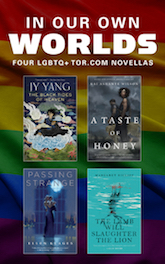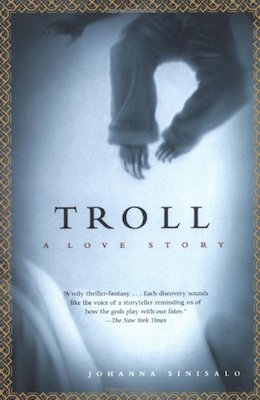Johanna Sinisalo’s Tiptree Award-winning Troll: A Love Story (also available in the U.K. as Not Before Sundown), translated from the Finnish by Herbert Lomas, is one of the earliest works of translated QUILTBAG+ speculative fiction that I could find, originally published in 2000. I enjoy Finnish SFF, and read it whenever I can both in English and in Hungarian translation. So I was especially looking forward to reading this novel—but in the end, it didn’t win me over.
In Troll, Angel, a young, gay photographer and designer rescues a strange male creature from the hands of teenage louts in a scene reminiscent of a gay bashing. Angel takes the dark, furry creature home and realizes that it is a juvenile troll, a being from Finnish mythology. The troll indisputably exists in the novel’s present-day setting, albeit as a rare animal that was assumed to be fictional until recently.
This sounds like a setup for classic urban fantasy, but instead, Troll offers something else: it combines narrative with nonfiction segments, from news clippings to folkloristics essays, and it ends on a science-fictional note. As Angel researches trolls, we are treated to his readings: some excerpted from real texts, some made up by the author. None of these quasi-nonfictional segments are overlong, and the narrative chapters are also short and snappy, often barely covering a full page. Life goes on, with the addition of the troll, who Angel names Pessi; Angel tries to find freelance assignments, hangs out with former and current romantic interests, interacts with his neighbors. But Pessi seems increasingly sick, and Angel doesn’t know how to help…
Among other aspects, I found it fascinating to see a protagonist who is a visual artist—this can be surprisingly uncommon in speculative fiction. Angel’s business interactions rang very true to me, including the deceptive billing practices, sadly; so I looked up the author in more detail and found that she herself used to work in advertising.
If you’re looking for a book to race through in a single sitting, this one is a good fit, despite being heavy on the quasi-nonfictional details and also on those of Angel’s everyday life. Angel tries to mine his friends for troll-related information at an increasingly frantic pace in order to save Pessi. His fate also becomes entangled with that of his downstairs neighbor Palomita. Angel leverages his charm for all that it’s worth, and begins engaging in more and more questionable behaviors like stealing from a sex partner and ex-boyfriend. As he uses his friends, he also uses the troll: he has been stuck on a series of advertisements for a major client, but now he has an ideal subject for the photoshoot…
If this consistently utilitarian aspect of the protagonist’s behavior makes you uncomfortable, there is more. Angel is sexually attracted to the troll, though he is discomforted by his arousal. The novel doesn’t show them having sex; still, the connection between homosexuality and bestiality here is hard to shake. Near the end, the reason for the attraction is revealed, but without spoiling much, I can say that the explanation involves a kind of “alphas and betas” quasi-biological essentialism. This approach has become dated not only because the science has moved on, but also because since the book’s release, similar arguments have been weaponized in popular discourse. I am certain this was not the author’s intent, but it is also hard not to make the comparison if you are a present-day reader.
Buy the Book


In Our Own Worlds: Four LGBTQ+ Tor.com Novellas
The racial and ethnic elements within the novel are also often jarring. Angel’s neighbor Palomita is the abused mail-order bride and sex slave of her Finnish husband, and her portrayal doesn’t become much more elaborate than that. The narrative dwells on the fact that the troll is black, and the plot follows the template of The Heart of Darkness, with the protagonist venturing into frightening lands where dark people live. I am probably not projecting my own biases into the book here: Sinisalo wrote another novel (Birdbrain) where The Heart of Darkness is explicitly named and quoted as a source of inspiration. In Troll, instead of Africa, the wilderness is located in Finland, but the racialization is still present—with the associations of both darkness and indigeneity.
I should also note that the book uses terminology about indigenous Sámi people that was dated even back when it was written, but this might be a matter of the translation, not of the original. Even still, Indigenous people only appear in the novel as a source of mysterious folklore (which the book leans on quite heavily), and are not represented as actual characters.
I also struggled with how the novel floats the idea of Pessi being more sentient than Angel assumes over the course of the narrative. (We only find out the answer at the end, but I feel this question can justifiably be called a theme throughout.) I thought that, as a reader, the potential sentience of the troll was intended to mitigate my upset at the queerness–bestiality connection, but it only made me have more difficulty with Angel using and instrumentalizing Pessi for his own ends. If Pessi is an animal (and a juvenile one at that!), then it is the sexual attraction that makes me most uneasy; if Pessi is sentient, it is the exploitation. Said exploitation also evokes themes of historical subjugation—echoing disturbing human/ethnological exhibits of the past up through quite recent history—that the book does not really engage with, just as it doesn’t engage in a discussion of sexual slavery beyond the most surface trappings. I am not averse to novels exploring very heavy, complex topics, but with Troll, I felt like the heavy topics were introduced possibly for controversy’s sake and then not explored much, if at all. Adding Angel’s increasingly questionable actions into this mix did not make for a good combination, either.
Of course, we do not need to sympathize with the protagonist of a novel or story, but when there is still very little translated QUILTBAG+ SFF to this day, it is disappointing to find a much-lauded book where queerness is shown in such a negative context. And yet Troll is well-written, well-paced, and intriguing. I am not surprised it has won awards, but I wouldn’t suggest spending your well-earned holiday time on it, either.
Bogi Takács is a Hungarian Jewish agender trans person (e/em/eir/emself or singular they pronouns) currently living in the US with eir family and a congregation of books. Bogi writes, reviews and edits speculative fiction, and is currently a finalist for the Hugo, Lambda and Locus awards. You can find em at Bogi Reads the World, and on Twitter and Patreon as @bogiperson.










